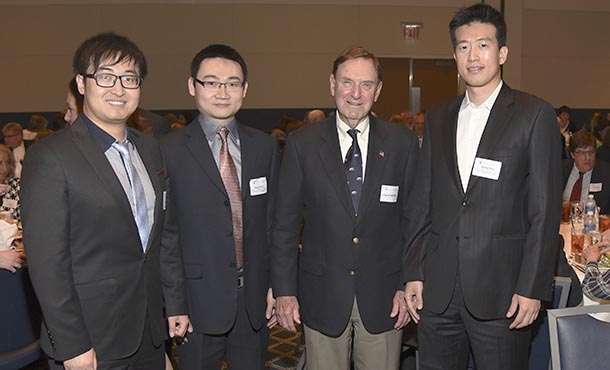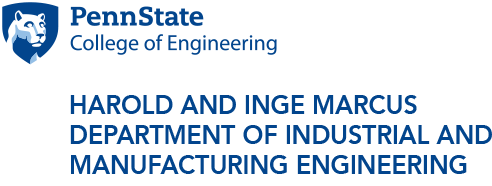
Charles Schneider meets with industrial engineering graduate students Hongyuan La, Jun Feng Ma and Kijun Park at a recent dinner hosted by the College of Engineering.
Industrial engineers apply traditional approaches to service industry challenges
5/5/2015
UNIVERSITY PARK, Pa. — Service enterprise engineering, or service engineering, is modifying intangible experiences — such as doctors’ visits, mobile phone service or call centers — in order to streamline efficiencies while improving customer service and satisfaction. Industrial engineers at Penn State are reaching out to a variety of service sectors, such as banking, healthcare, transportation and more, to apply their knowledge of engineering to the unique challenges these businesses face.
Faculty and students in the Harold and Inge Marcus Department of Industrial and Manufacturing Engineering at Penn State are bringing service engineering to the forefront of their efforts thanks in large part to the Fund for Excellence in Service Engineering that was gifted to the department by Charles and Enid Schneider.
The founder and CEO of U.S. Security Associates, a service company with 46,000 employees, Charles Schneider (’62 M E) understands the importance of increasing the number of well-trained engineers in the service sector. He is the chair of the Service Enterprise Engineering (SEE) Advisory Board, which provides input on service engineering curriculum and identifies emerging research areas to the Marcus department.
“Excellent entrepreneurial opportunities exist in the service industries because of low capital requirements and barriers to entry,” he said. “As a young engineer, I was reluctant to enter the service industries because I believed engineers ‘made things.’ However, I took the leap by starting a service business from scratch 20 years ago that is now a $1.3 billion business.”
Employment in the service sector exceeds 80 percent of all employment, but service processes have not received nearly the same amount of attention as those in manufacturing, according to Schneider. He believes that there are numerous opportunities for Penn State graduates to increase the productivity and quality of such major service sectors as health and governmental services through the application of better-engineered processes.
“Beyond growth as a career propellant, many service industries are woefully ‘under-engineered’ and engineering concepts are directly applicable to improving service business processes, productivity and quality,” said Charles Schneider. “Engineers have an opportunity to make an immediate, meaningful contribution and distinguish themselves in service businesses that may not have previously taken full advantage of engineering techniques.”
Schneider recently returned to the University Park campus for the SEE board meeting and an endowment dinner hosted by the College of Engineering. There he had the opportunity to meet with some of the students working on service engineering projects and discuss ongoing research within the department.
One of the students he met, Kijung Park, is a doctoral candidate in industrial engineering, studying the definitions of complexity and its properties (e.g. static versus dynamic) and the metrics used to quantify intricacy in product-service systems.
“I am looking at the impact of complexity on product-service systems and researching how to effectively manage intricacies in service systems,” he said.
Another student that met with Charles Schneider, doctoral student Jun Feng Ma, is looking at the impact of modules and modularity in service engineering and how the concepts could reduce the complexity of service systems.
“Module and modularity can benefit the supply chain by reducing inventory costs and saving distribution time,” he said. “Additionally, these concepts can also benefit the reverse supply chain due to the concentration of products and components in end-of-life strategies.”
The SEE Advisory Board is working directly with the Marcus department to increase the visibility of service engineering and communicating the opportunities in the field while celebrating the successes of industrial engineers working in service industries.



